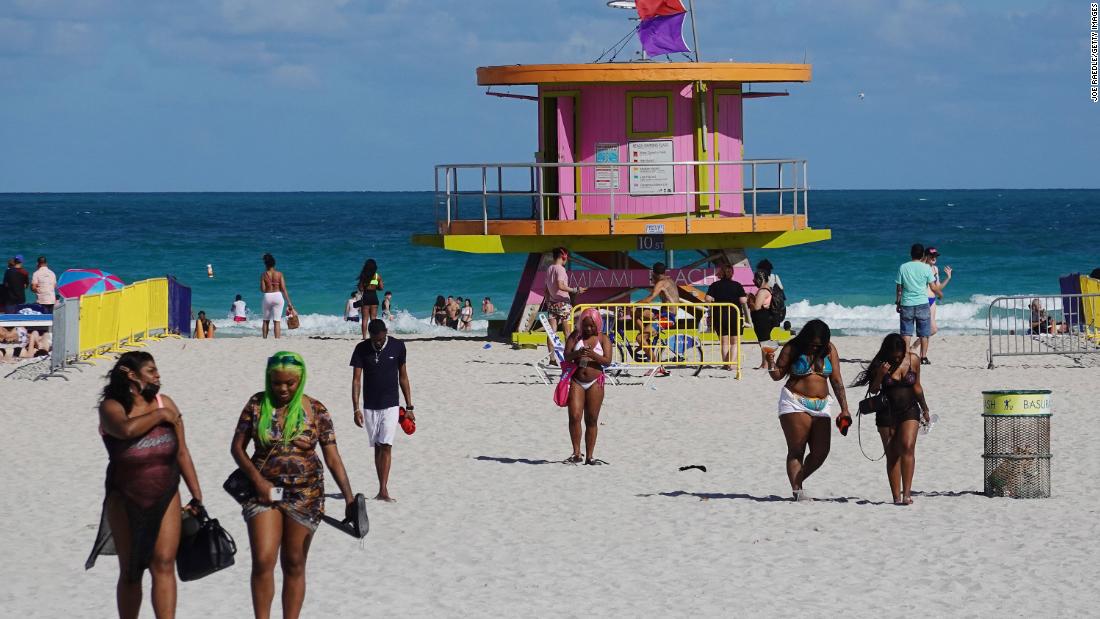(CNN) — An already powerful pent-up desire to travel has only intensified with global weariness of pandemic restrictions and the rollout of vaccines in some countries.
In the United States, many people — as seen in the crowds of spring break revelers in Florida and the latest passenger tallies at airport security checkpoints — are already on the move, whether they’re vaccinated or not.
Some Americans are awaiting CDC guidance on travel for the fully vaccinated, while others who’ve had their shots are already traveling or making plans.
People are asking from different corners of the globe: “Can I travel — and should I?” The answers are never universal.
In the United Kingdom, travel — domestic or international — is currently prohibited by the government. In Ireland, citizens must stay within a 5-kilometer radius of their homes for exercise. The United States clearly has far fewer restrictions on movement.
When and how far you can travel — and whether the choice is yours — depends on where you live and, in many cases, on your own risk tolerance.

Spring break has sparked tension in Miami Beach, Florida, over concerns about virus transmission.
Joe Raedle/Getty Images
Should I travel?
There’s a low risk of getting or transmitting coronavirus in transit, especially when people are traveling by private vehicle, said Wen, an emergency physician and visiting professor at George Washington University Milken Institute School of Public Health. Air travel, particularly when everyone is masked, is also quite safe, she said.
“If travel is very low risk in and of itself, why can’t we be saying that fully vaccinated people can travel to different parts of the country to visit their relatives as long as … they’re not gathering a lot of unvaccinated people who are in different households?”
The CDC has said it plans to release travel guidance for vaccinated Americans soon.
Even those who haven’t been vaccinated can travel in a relatively safe manner, Wen said, if they’re going with the objective of seeing one other family.
“That’s low risk, and there are ways for unvaccinated people to still do that safely. For example, they can quarantine and get tested prior to the trip,” she said.
Tony Johnston, coming at the “should I travel” question from Ireland from a tourism rather than a medical perspective, has a definitive answer in the other direction.
We should not travel yet, he says.
“People need to remain cautious and conservative for another few months. The great prize, if people are patient, is that the international tourism industry will reopen sooner rather than later,” said Johnston, who is head of the department of hospitality, tourism and leisure studies at Athlone Institute of Technology.
Another wave of the virus could jeopardize that reopening, he said, noting that Ireland’s hospitality industry is still completely closed. Politicians are calling for a very cautious reopening, given the skyrocketing number of hospitalizations and deaths in the country after Christmas.

Many Americans are ready to travel, with pandemic-era record numbers of passengers this month at US airports.
Scott Olson/Getty Images
It’s what happens when you get there that’s key
For those who plan to travel, what you do when you get to your destination is often a bigger concern than what happens in transit, said Dr. William Schaffner, an infectious diseases specialist at Vanderbilt University Medical Center in Nashville, Tennessee.
“The most careful way to travel is by car because you can create a cocoon of protection, you can run in and out of restrooms, you can get drive-through food, you can take wipes with you when you wipe off the gas pump when you’re refilling the tank.
“But once again, it’s what you do wherever you’re going that increases your risk.”
Spring breakers in Florida are gathering at the beach outside, but then they go to bars and restaurants “and that’s when they have a drink or three and the masks come off, and they speak with enthusiasm and they’re close to other people in enclosed spaces for prolonged periods of time,” Schaffner said.
Travelers who plan to engage in higher risk activities should ideally wait until they’re vaccinated, Wen said, “and even then try to pick and choose your activities because you don’t want to do everything that’s high risk all together.”
Caution is essential — for unvaccinated and vaccinated travelers
Remember that vaccinations are not a “suit of armor,” Schaffner says. It’s still important to wear masks and maintain social distance as much as possible.
Schaffner and his wife were recently talking with three other couples they know, all of whom have been fully vaccinated and have upcoming travel plans.
His wife recently drove down to Florida with a friend who has been very careful and got tested in advance to attend to some business at their house there.
“They were absolutely meticulous” about safety, he said. They ate most of their meals at home with the exception of one late lunch in “a completely outdoors location where there were essentially no other people around.”
If you are unvaccinated and engaging in higher-risk behaviors while you’re away, you should quarantine and then get tested once you get home, Wen said.
The best advice for anyone who intends to travel soon?
First off, “please do everything you can to get vaccinated. Number 2, if you can’t get vaccinated, get tested before you go to make sure that you’re negative. And Number 3, where are you going and what do you intend to do? Please be as careful as possible,” Schaffner says.
He has a colleague who signs off of every phone call with, “Stay out of the bars!”
Good advice, he says.
